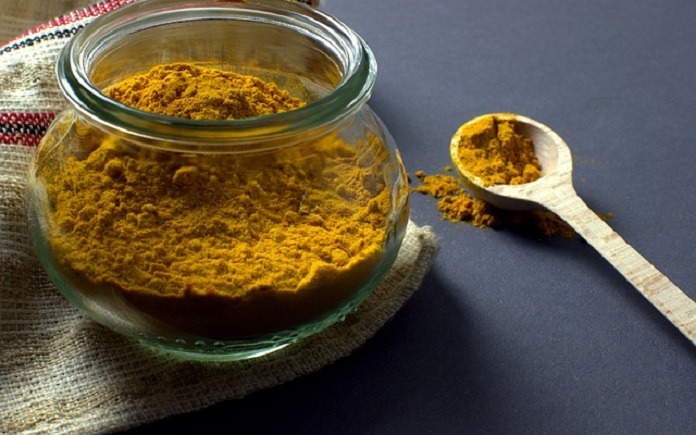A growing body of research is investigating the potential health benefits of turmeric for endometriosis pain and symptoms.
Endometriosis is a chronic inflammatory condition in which the uterine glands and endometrial tissues are present outside of the uterus.1 These extrauterine tissues and chronic inflammation can cause painful lesions in the reproductive system as well as other consequences.
It is associated with a variety of symptoms, including painful menstrual periods (dysmenorrhea), irregular uterine bleeding, infertility, and chronic pelvic pain.1,2,3 These symptoms can be very severe and prevent people with endometriosis from doing what they want to do.
Endometriosis may also be associated with an increased risk of other conditions, such as certain autoimmune issues and certain cancers; however, more research is needed.4,5
Endometriosis often goes undiagnosed. The average period of time between when an endometriosis patient notices symptoms and when they are surgically diagnosed is 6.7 years.1,3
As a result, many patients with endometriosis experience these often debilitating symptoms for years prior to receiving a diagnosis and subsequent treatment.
What are some treatments for endometriosis?
There is no permanent cure for endometriosis; however, there are a variety of therapies available to help manage the symptoms.
Some hormonal therapies used to manage endometriosis may include the birth control pill and other hormonal contraceptives that prevent ovulation, progestins, and GnRH analogs that reduce estrogen, which endometriosis may depend on.1,5
Non-steroidal anti-inflammatory agents (NSAIDs) and other painkillers may also be prescribed to reduce the pain associated with endometriosis.5
Possible surgical treatments for endometriosis include the removal of the lesions or cutting some of the nerves in the uterus that communicate pain signals.5
However, these surgical interventions come with a variety of associated health risks, and hormonal therapies can have unwanted side effects.
A growing body of new research is investigating the potential use of plant-derived compounds (such as those found in turmeric) in different chronic inflammatory conditions, and more research is needed on this topic.
Turmeric for endometriosis
Turmeric, which is a golden-colored spice that has an earthy, bitter taste, contains a polyphenol called curcumin.6
Although curcumin is not approved by the FDA to treat any condition, a variety of studies suggest that it may have anti-inflammatory properties by regulating some components of the immune system.6,7
It is also generally recognized as safe according to many clinical trials, which is not the case with all herbal supplements.6
Since endometriosis is an inflammatory condition, some researchers hypothesize that turmeric (Curcumin) could potentially help in reducing inflammatory symptoms of endometriosis.
This article will discuss some of the research surrounding this theory.
Theoretically, there is a possibility that curcumin found in turmeric could help alleviate the symptoms and severity of endometriosis symptoms.
According to one review of scientific studies, curcumin could potentially help reduce inflammation through the downregulation of the NF-kB pathway, which is a process of biochemical reactions that is associated with the pathogenesis of endometriosis.7,8
In addition, curcumin appears to have antioxidant activity, as shown in current research.6.7.9 Antioxidants work to neutralize free radicals, which are chemical compounds that are produced when exposed to certain environmental stressors and during the aging process.
Oxidative stress occurs when there are excess free radicals resulting from an imbalance of antioxidants and free radicals, and it can be associated with cell and tissue damage.10
Some studies show that oxidative stress may also be associated with endometriosis, which could make turmeric for endometriosis an interesting potential therapy to research.7,11
More research is needed
More research is needed to confirm these potential benefits of turmeric, and more research is needed to determine whether turmeric might be a helpful therapy for endometriosis.
Always speak with your doctor before taking any supplements to make sure they are right for you.
References
- Burney, R.O., Giudice, L.C. (2013, November). Pathogenesis and pathophysiology of endometriosis. Fertil Steril 98(3). Doi: 10.1016/j.fertnstert.2012.06.029
- Maddern, J., Grundy, L., Castro, J., et al (2020, October). Pain in Endometriosis. Front Cell Neurosci 14: 590823. Doi: 10.3389/fncel.2020.590823
- Nnocham, K.E>, Hummelshoj, L., Webster, P., et al (2011, August). Impact of endometriosis on quality of life and work productivity: a multicenter study across ten countries. Fertil Steril 96(2): 366-373. Doi: 10.1016/j.fertnstert.2011.05.090.
- Yu, H., Lin, C., Chang, W., et al (2015). Increased association between endometriosis and endometrial cancer. Int J Gynecol Cancer 25(3): 447-452. Doi: 10.1097/IGC.0000000000000384
- Institute for Quality and Efficiency in Health Care (2017, October 19). Treatment options for endometriosis. InformedHealth.org [Internet]. Accessed 2021, August 7, from https://www.ncbi.nlm.nih.gov/books/NBK279498/
- Hewlings, S.J., Kalman, D.S. (2017). Curcumin: A review of its effects on human health. Foods 6(10): 92. Doi: 10.3390/foods6100092
- Valee, A., Lecarpentier, Y. (2020, April). Curcumin and Endometriosis. Int J Mol Sci 21(7): 2440. Doi: 10.3390/ijms21072440
- Kim, K., Lee, E.N., Park, J.K., et al (2012). Curcumin attenuates TNF-a-induced expression of intercellular adhesion molecule-1, vascular cell adhesion molecule-1 and proinflammatory cytokines in human endometriosis stromal cells. Phytother Res 26(7): 1037-1047. Doi: 10.1002/ptr.3694
- Soetikno, V., Sari, F.R., Lakshmanan, A.P., et al (2013). Curcumin alleviates oxidative stress, inflammation, and renal fibrosis in remnant kidney through the Nrf2-keap1 pathway. Mol Nutr Food Res 57(9): 1649-1659. Doi: 10.1002/mnfr.201200540
- Pizzino, G., Irrera, N., Cucinotta, M., et al (2017). Oxidative stress: harms and benefits for human health. Oxid Med Cell Longev 2017: 8416763. Doi: 10.1155/2017/8416763.
- Van Langendonckt, A., Casanas-Roux, F., Donnez, J. (2002). Oxidative stress and peritoneal endometriosis. Fertil Steril 77(5): 861-870. Doi: 10.1016/s0015-0282(02)02959-x



